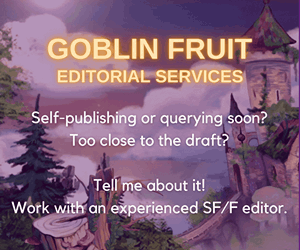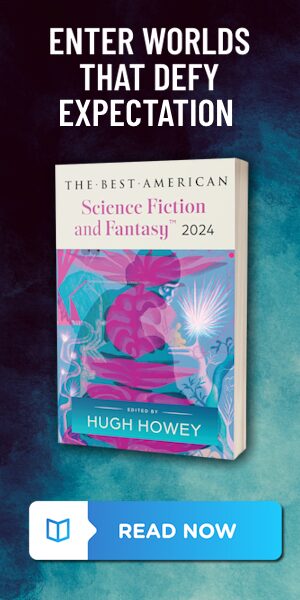What inspired such a dark retelling?
Honestly, I think a lot of it was general anger around sexism and misogyny in SF&F and how it was being talked about at the time the story was written. A number of things were happening in the community in terms of arguments for the need for different stories with different approaches, for the representation of people who had been invisible for too long, and of course there was the usual group of people who were unable to or refused to Get It. Watching that debate—though really I hesitate to call it a debate—was profoundly frustrating, and that frustration came out in the writing of the story. I wanted to twist things around and get a kind of creative revenge.
Losing your voice is a large theme of the story. What was your plan for making this clear theme of male dominance?
See above. One of the things that I think comes up a lot in discussions around representation in fiction—both in terms of characters and authors—is the idea that groups of people are rendered voiceless, that they simply aren’t heard and space is not made for them to speak when they do. Losing one’s voice feels like an especially vicious form of oppression, and fighting for the right to reclaim that voice is such a powerful form of resistance. One of the things that’s always bothered me about “The Little Mermaid” is that willingness to give up so much power, and I think it’s a theme that comes up again and again in fiction: the expectation that women will sacrifice agency for the love and approval of men. I wanted to try to subvert that trope in a really aggressive way.
There’s appropriately a lot of water and sea foam imagery throughout the story. For you, what was the importance of “sea foam,” and how important was establishing the underwater world, especially the witch’s lair?
The significance of that was mostly unconscious on my part, and it was only after that I noticed it at all. In the original fairy tale, that’s the fate of a mermaid when she dies—to turn into foam on the waves, to literally become almost nothing. Humans, meanwhile, have eternal souls and can achieve Paradise. That’s something else that I found very unfair at an early age, the idea that sentient creatures are worth nothing if they don’t adhere to a standard of humanity. The mermaid wants a soul in addition to her prince, which is part of why she makes a deal with the witch. Perhaps most anger-inducing for me is the fact that if the mermaid fails to get her prince to marry her, she’ll lose her chance at getting a soul anyway. Without the prince, she is nothing. She ceases to exist. So for me, the foam plays a similar role to the loss of a voice: a symbol of a fate that the mermaid is purposefully rejecting.
The world under the sea, rather, is what she embraces, not as a place where she has to be but a place in which she chooses to live. Even the witch’s home is a place into which she goes without fear, and it’s where she makes the choice that ultimately frees her. It’s where she decides that she owes nothing to anyone but herself.
What else do you have coming up?
I’m currently working on a number of cool projects! Most of them are longer works rather than short stories, though I also have some of those in the pipeline. I have a story in the anthology Long Hidden: Speculative Fiction from the Margins of History that I’m very excited about; it looks like an amazing book and I’m so happy to be involved in it. I also have a story coming out in Apex sometime in 2014, which is actually another, more general take on fairy tale themes and the Monstrous Feminine. Otherwise, I’m working on the sequel to my QUILTBAG space opera Line and Orbit (the latter will be out in print this February), as well as the third book in my Casting the Bones trilogy. I also just completed another standalone novel set in the Line and Orbit universe, which I’m hoping will get a release sometime in late 2014/early 2015.
Enjoyed this article? Consider supporting us via one of the following methods:










